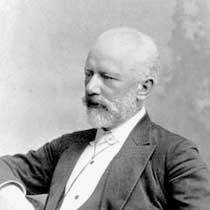Peter Tchaikovsky was born in 1840. He started learning piano when he was 5 years old, and got good quickly. His parents supported his musical talent at first, but then sent him to be a civil servant.
His mother died when he was 14. This tragedy deeply affected the young composer for the rest of his life. His mother's death was the inspiration for his composing - he wrote his first piece (a waltz for piano) in her memory.
He went on to study law and had a short career as a civil servant. But he hated it, so switched to studying at the St Petersburg Conservatory instead. After graduating, he became professor of music theory at the new Moscow Conservatory. He kept on composing during his professorship, and his reputation as a composer grew.
Other Russian musicians and composers shunned Tchaikovsky for a long time at the start of his career. They considered him a bit of an untrustworthy renegade since his music had a very western sound, and was more personally emotional than usual.
The Tsar noticed him eventually, gave him the Imperial stamp of approval and a lifetime pension, and suddenly Tchaikovsky was accepted in Russia.
He became even more famous, and traveled to other countries in Europe and the United States to conduct his own music. But although he was hugely successful, he was still under the black cloud of depression.
His sixth and last symphony (called the Pathétique) was premiered only ten days before the composer died (he died on November 6 1893).

No comments:
Post a Comment